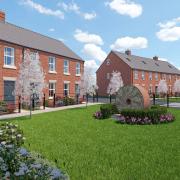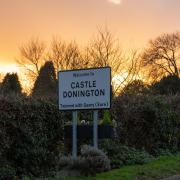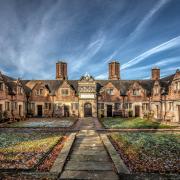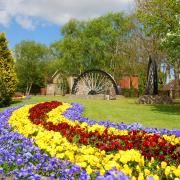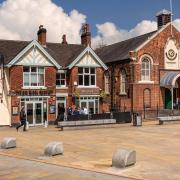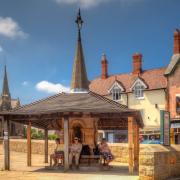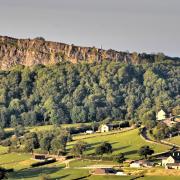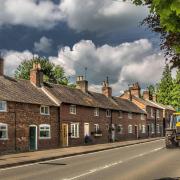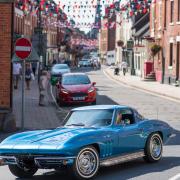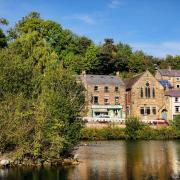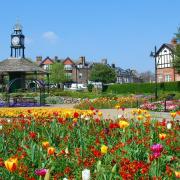Home to an impressive new leisure centre and the Buddhist World Peace Café,
Ashley Franklin finds a community that has put 20th century expansion and traffic problems behind it, but still keeps traditional village life at its heart
In spite of Etwall’s massive school and housing developments, a recent Parish Plan confirmed that in ‘having a prominent church and substantial open space at its centre, Etwall retains the feel of a village rather than a suburb.’ New resident and former city dweller Grant Blake believes Etwall is ‘how I imagined village life to be, with lovely old buildings and people who are proud of their surroundings, community-spirited and very welcoming.’ John Lemmon, South Derbyshire District Councillor for Etwall for nearly 25 years and a resident for even longer, makes the excellent point that although Etwall’s location six miles south west of Derby make it ideally placed for residents to commute to work in nearby cities and towns, ‘this effectively gives them more social time to participate in community activities’. Although residential developments between the 1950s and 1980s saw Etwall expand threefold, the building of a by-pass in the early 1990s returned Etwall’s rurality almost overnight and created, in the words of writer and former villager Don Shaw, a ‘country island’. Residents must, however, feel as if the by-pass never happened when twice a day, Monday to Friday, nearly 2,400 students and staff pour through the gates of John Port School, almost doubling the village population. The Leisure Centre, which shares the same site, adds another 7,000 visitors weekly. Etwall has become important not only for its residents but for the whole of south west Derbyshire. The daily influx of people has helped to develop and sustain a wide span of village facilities. Most of these are clustered around the traditional village centre, where the parish church still dominates the view alongside an expanse of green, quietly leading to some of the most attractive almshouses in the county.
ETTA’S WELL & JOHN PORTIt’s appropriate that the biggest annual event in Etwall is the well dressing festival. Forty years ago, the first well dressing was displayed at ‘Etta’s Well’. At the time the well was visible, but at some point a Health & Safety official must have seen some danger and it is now encased in concrete. It was the ease of digging wells to the water stored on the local clay base that resulted in a settlement here around the 7th century. Etwall still has the remains of up to 70 wells. The word ‘Etwell’ is still embossed on the bricks of the village’s older properties as a consequence of the thriving brick industry that grew up here, though agriculture was the dominant industry. Resident Maurice Vaughan says that cattle were herded through Main Street until the 1950s. After this the increase in traffic on what was the main route from Derby to Liverpool saw it become part of a ‘busy and dangerous’ road. In 1835, according to Pigot’s Derbyshire Directory, Etwall was ‘a pleasant village... but is destitute of manufactures, and its local trade is very unimportant.’ Things might have been different had Sir John Port of Etwall Hall been more specific in his will of 1557. Recognised as the founder of Repton School, Sir John actually left bequests for the creation of a ‘Grammar School in Etwalle or Reptone’. Despite the choice of Repton, Sir John Port’s legacy has become more prominent in Etwall simply through the use of his name for the school that was built in the Hall grounds after it was demolished in the 1950s. Fortunately the splendid wrought-iron gates by Robert Bakewell that guarded the Hall drive were found an appropriate home in front of the almshouses Sir John also bequeathed. Amazingly, until the 1960s – four centuries on – the Almsmen were still attending church daily wearing the time-honoured costume of mortar-board style hats and blue cloaks with a silver clasp – an outfit they were also buried in.
A WALK ROUND ETWALLA quick glance down the main street is enough to find other very attractive buildings. There’s St Helen’s Church, which dates from the 12th century; the Methodist Chapel, built by the famous Minton porcelain family in 1838; The Ivies, a timber-frame house thought to be nearly 600 years old; and Blenheim House, an 18th century farmhouse that is now a hotel and restaurant, revitalised by new owners Russell and Ewa Davies. For them, Blenheim House was love at first sight: ‘It was the best of both worlds,’ observed Russell. ‘A combination of traditional character and modernist design.’ It was a risky venture in recessionary times but Russell and Ewa sought to increase quality at a reduced price, crucially unleashing the talent of their chef Martin Rose. ‘It’s worked,’ smiles Russell. ‘At first we saw 10 to 15 people on Friday and Saturday nights, now we have 40 plus, and on a Sunday you have to book in advance.’ Russell describes the cuisine as ‘typically English with premium products.’ Adding, ‘Every diner gets an exceptional bespoke experience, all provided by articulate, personable staff.’ Occupancy of the Blenheim’s 10 rooms has shot up, helped greatly by its location, close to business ‘traffic’ from Toyota, JCB, Rolls-Royce and Marston’s. The Blenheim also welcomes locals in for a drink, and as Russell states, ‘What’s even more heart-warming is feeling that the villagers wanted us to succeed.’ The Spread Eagle pub, which dates back to 1577, has also recently had a new lease of life. In the style of Remington boss Victor Kiam – ‘I liked the shaver so much I bought the company’ – a group of pub regulars rescued the ailing Spread Eagle by buying the freehold from Punch Taverns. Less certain is the future of the Hawk & Buckle which takes its name from the buckled hawk on the crest of the Cotton family who built the pub in 1851. Noting the ‘Store of the Year’ banner above the Londis store, I popped in and asked the young assistant if I could see the manager. ‘You’re looking at him,’ he smiled. Sam Nye began his working life aged 13 as a paperboy in Etwall and now, aged 19, supervises the delivery of over 2,500 newspapers per day as the youngest ever Londis store manager in the UK. This store also won the ‘Newsagent of the Year’ award last year. ‘Customer service is key,’ notes Sam. ‘We provide a high standard of service as well as a warm and friendly environment.’ There’s a warm welcome in the Post Office from owners Norman and Shelagh Stansfield, who arrived seven years ago. Personal service is paramount here, too, with Norman and Shelagh spending the first 12 months of their occupancy canvassing customers – ‘We wanted to know what they were looking for in “their” shop,’ remarks Norman. Extensions and refurbishment took place and there is now a delightful Tea Rooms.
BUDDHISM AND EQUESTRIANISMIn the Post Office Tea Rooms, I met Grant Blake enjoying his Saturday treat of breakfast rolls and coffee. Grant rents a flat in Ashe Hall, a mid 19th century house in the Etwall countryside, now better known as the Tara Buddhist Centre – ‘an oasis of peace and tranquillity in a turbulent world,’ affirms Grant. It’s an awe-inspiring place from the start as the driveway is lined with giant redwood trees, normally only seen in the Sierra Nevada Mountains of California. This is one of the largest Buddhist centres in the country and, according to administrative director Vanessa Jennings, the location is perfect: ‘We’re close to major road networks but in quiet countryside and as our aim is to offer peace of mind through meditation, retreat and Buddha’s teachings, we’re accessible in both senses.’ Visitors come to walk in the 38 acres of grounds, attend meditations and classes or to enjoy the World Peace Cafe which has the unusual distinction of being the first English Tourist Council accredited B&B accommodation in the UK dedicated to World Peace. More vigorous but equally relaxing activity can be found around the corner at Barleyfields, an equestrian centre run by Fiona Holton, who has built up her flourishing business from scratch 15 years ago and caters for infants through to riders in their 70s. There are indoor and outdoor arenas, two cross country courses, show jumping facilities, ‘pleasant hacking country’, and a well-stocked saddlery.
LEISURE, LEARNING AND DRESSINGThe village hall – named after Councillor Frank Wickham who campaigned tirelessly to improve village facilities – is the focus of a wide range of leisure activities. Perhaps the most high profile of these, involving as it does activities and entertainments throughout the village, is Etwall Well Dressings (15th and 16th May). They began in 1970 to celebrate the primary school’s 100th anniversary. The Women’s Institute volunteered the first dressing and after initial advice from old hands at Tissington and Youlgreave, they are now clearly of a quality comparable with their Peak counterparts. Well Dressing Association secretary Cliff Noon and his wife Desiree moved to Etwall in 2001 from the South and admit they initially thought well dressing was ‘something to do with fashion’. Now, they and scores of other residents throw themselves into the puddling and petalling of wood framed tableaux. There is a constant buzz of activity at Etwall’s new �6.7m Leisure Centre which attracts 28,000 users a month. Usage of the new six-lane swimming pool has tripled that of the old – if you’re under 18 or over 60, it’s free – with 600 children a week taking lessons. If Etwall doesn’t produce another Rebecca Adlington, it may well discover a new Donna Kellogg, who opened the Centre last September: there is an impressive six-court sports hall built to National Badminton England standard. The substantial size of the Leisure Centre is largely due to its connection with John Port School which, with 2,100 pupils and over 300 full, part-time and associate staff, is the fourth largest comprehensive in the UK and may be the biggest village school in the world. Wendy Sharp has just marked her first year as headteacher at John Port and appears well at ease with such a daunting job. She has, she says, embraced John Port’s mission statement which is: ‘The opportunity to succeed.’ Many former pupils have certainly gone on to succeed, notably Kathy Pritchard-Jones, Professor of Childhood Cancer Biology at the Royal Marsden Hospital; actor Jason Riddington Smith; and Steve Round, Assistant Manager at Everton FC. Another successful resident was the last owner of Etwall Hall, racing driver Reg Parnell, a competitor in the first F1 World Championship Grand Prix at Silverstone in 1950. Award-winning playwright and author Don Shaw also lived in Etwall. While here in the 1980s he wrote his BAFTA award-winning Bomber Harris as well as Sounding Brass, which used Etwall as a location, its star Brian Glover conducting the band as it paraded around the village. Don moved to a house in Sutton Lane. ‘It was beautiful in those days,’ he recalls. ‘A place of dreamy meadows, buttercups in spring and grazing cattle.’ Almost as soon as his family had settled, there came the announcement of a by-pass through his land, so he moved to Mickleover.
THE BY-PASS AND AFTERThe Etwall By-Pass was mostly welcomed with blessed relief. The traffic flow through Etwall was ‘horrendous’ and ‘intolerable’, and lead to the formation of RAGE – Road Action Group Etwall. I was told it wasn’t so much rage as resentment each time Etwall was affected by a fresh wave of housing developments. I came across the story of a resident petitioning against the building of a new street which would obliterate his country view. All his neighbours signed the petition except one who said: ‘This time last year I was petitioning to stop your house being built.’ Times have changed and residents, as in many other villages, see the need for affordable housing for young families – especially those wanting to return to the village where they grew up – and single storey dwellings for the ageing population. Parish Council Chairman Ivor Smith and Vice Chairman David Muller told me there are still pockets of land that could be built on. ‘Yes, we want change,’ says David, ‘but sympathetic change, and we must ensure Etwall doesn’t ever become an extension of Derby or Mickleover.’ They also told me of the new threat to Etwall. After RAGE comes ROAR – Residents’ Organisation Against the Railhead – to fight the prospect of a warehouse development by the A50. Otherwise, Etwall is a fairly contented village. A safe one, too, with a highly regarded Neighbourhood Watch which has kept crime low. ‘Ever since I came to Etwall I have found people to be friendly, happy and smiling,’ says David. ‘Etwall has a big heart,’ says Fiona Holton, which led Ivor to inform me that Etwall may lack adoctor’s surgery but it didn’t lack neighbours volunteering to drive people to the nearest one. One idea for improvement both Ivor and David approved was to have a farmers’ market in the village centre with stalls on the green. ‘After all, this is farming country,’ says David, ‘and it would help maintain Etwall as a true village



